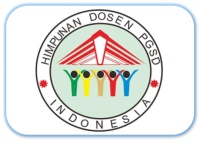PENGARUH PENERAPAN MODEL KOOPERATIF TIPE JIGSAW TERHADAP HASIL BELAJAR SISWA MATERI KELILING DAN LUAS BANGUN DATAR KELAS IV SEKOLAH DASAR
Abstract
This study aims to determine the effect of the application of the jigsaw type cooperative model to the learning outcomes of traveling around and flat area of grade IV elementary school. This research is a quantitative study, using Pretest-Posttest Control Group Design. The sampling technique is the Simple Random Sampling technique. Two sample classes are selected that will serve as the experimental and control classes. Learning compared is learning with a Jigsaw Cooperative approach with learning using a conventional approach. Data collection techniques are test instruments. Tests are given namely on the circumferential material and flat area in the form of objective questions. Data were analyzed using t-test. t arithmetic> t table, then H0 is rejected and Ha is accepted, that is tcount> t table which is 3.235> 2.011 means Ha is accepted and H0 is rejected. It was concluded that there were differences in student learning outcomes using the Jigsaw Cooperative Learning model with student learning outcomes using the conventional approach to learning to get up and down in class IV Elementary School.
Keywords
Full Text:
PDFReferences
Ahmad, Syafri, Kenedi, A. K., & Masniladevi, M. (2018). Instrumen Hots Matematika Bagi Mahasiswa Pgsd. Jurnal PajaR (Pendidikan Dan Pengajaran). https://doi.org/10.33578/pjr.v2i6.6530
Amini, Risda dan A. Munandar. (2010). Pengaruh Model Pembelajaran Pendidikan Lingkungan Berbasis Outdoor Terhadap Penguasaan Konsep Pendidikan Lingkungan Bagi Calon Guru Sekolah Dasar. Vol 11. No 1
Arikunto, S. (2014). Prosedur Penilaian. Jakarta: PT. Rineka Cipta.
Armanto, S., Armanto, D., & Harahap, M. B. (2014). Perbedaan Penerapan Model Pembelajaran Kooperatif Tipe Jigsaw dan STAD Ditinjau dari Kemampuan Penalaran dan Komunikasi Matematis Siswa SMA. Jurnal Didaktik Matematika, 1(1).
Berlin, Kurniasih. (2016). Ragam Pengembangan Model Pembelajaran . Jakarta : CV Solusi Distribusi
Isjoni. (2013). Pembelajaran Kooperatif Meningkatkan Kecerdasan Komunikasi Antar Peserta Didik. Yogyakarta: Pustaka Pelajar.
Isjoni. (2016). Cooveratif Learning Mengembangkan Kemampuan Belajar Kelompok. Bandung: Alfabeta
Juwaeriah, S., Muhyani, & Ikhtiono, G. (2017). Pengaruh Model Pembelajaran Kooperatif Tipe Jigsaw terhadap Motivasi Belajar dan Hasil Belajar Siswa pada Mata Pelajaran Matematika, 1(2), 78–93.
Lestari, kurnia E., & Yudhanegara, M. R. (2017). Penelitian Pendidikan Matematika. Bandung: PT Refika Aditama.
Nur Fiyany, F. (2018). Keefektifan Model Pembelajaran Bamboo Dancing dan Jigsaw Ditinjau Dari Hsail Belajar Matematika Siswa Kelas 4 SD. JTAM | Jurnal Teori Dan Aplikasi Matematika. https://doi.org/10.31764/jtam.v2i1.286
Rahmatina, Kenedi, A. K., Eliyasni, R., & Fransyaigu, R. (2019). Jigsaw using animation media for elementary school. Journal of Physics: Conference Series. https://doi.org/10.1088/1742-6596/1424/1/012027
Sugiyono. (2016).Metode Penelitian. Bandung: Alfabeta
Suparni. (2017). Pengaruh Model Pembelajaran Kooperatif Tipe Jigsaw terhadap Hasil Belajar Matematika. vol 5 No 4
Permendikbud. (2016). Peraturan Menteri Pendidikan Dan Kebudayaan Nomor 24 Tahun 2016 Tentang Kompetensi Inti Dan Kompetensi Dasar Pelajaran Pada Kurikulum 2013 Pada Pendidikan Dasar Dan Pendidikan Menengah. Jakarta: Kemendikbud.
Priansa, D. J. (2016). Pengembangan Strategi & Model Pembelajaran. Bandung: CV PUSTAKA SETIA.
Rosyidah, U. (2016). Pengaruh Model Pembelajaran Kooperatif Tipe Jigsaw Terhadap Hasil Belajar Matematika Siswa Kelas Viii Smp Negeri 6 Metro. Jurnal SAP, 1(2), 115–124.
Sugiyono. (2015). Metode Penelitian Pendidikan. Bandung: Alfabeta.
DOI: http://dx.doi.org/10.24036/e-jipsd.v9i1.8895


